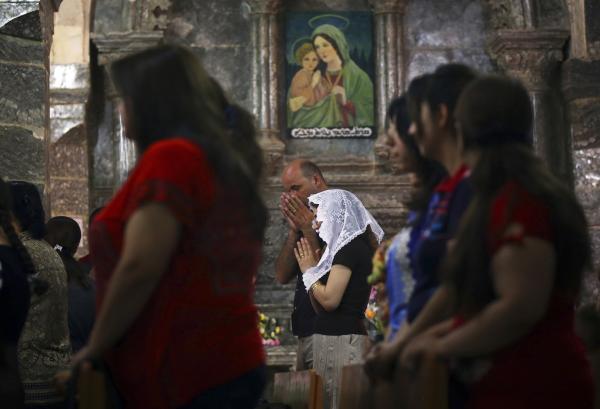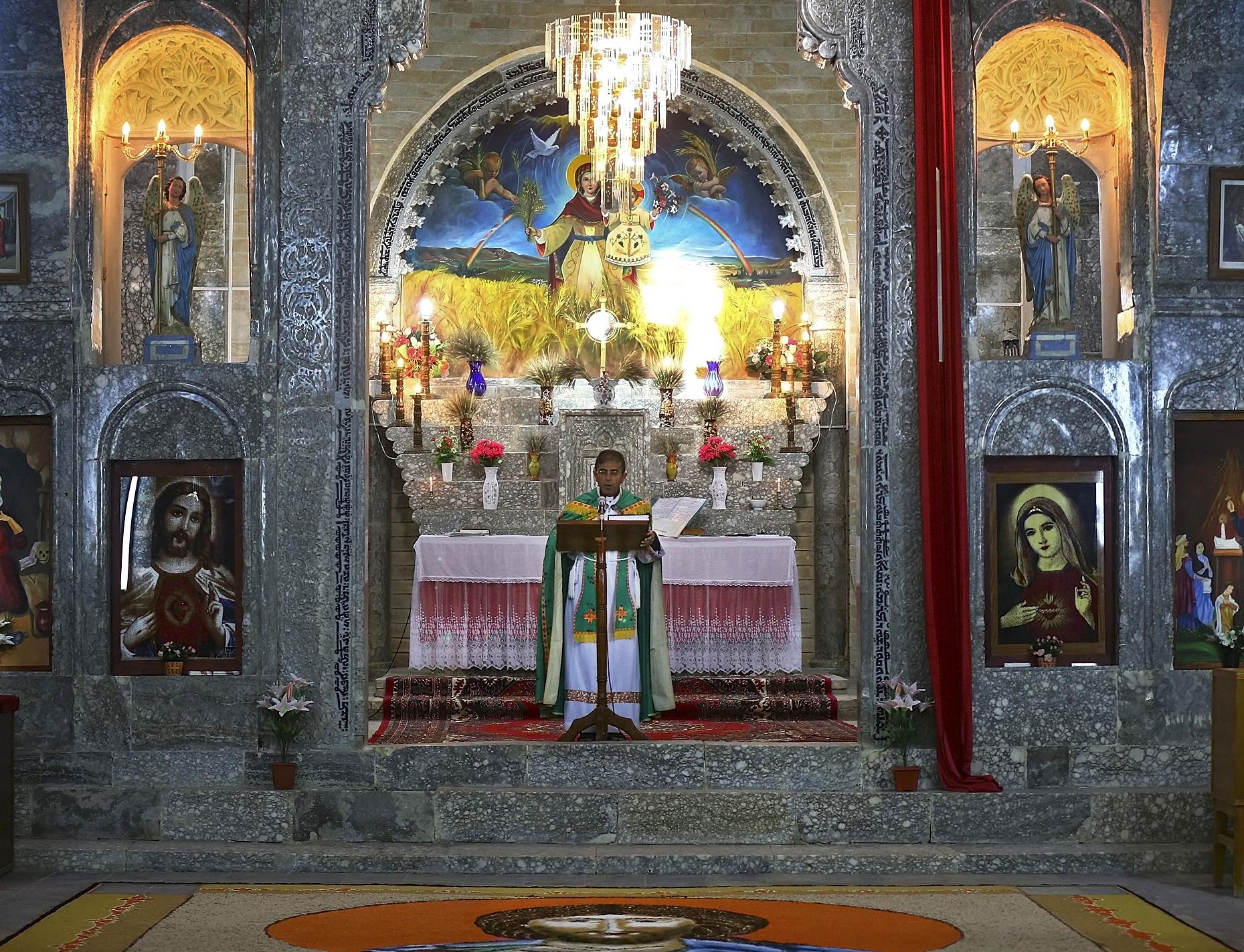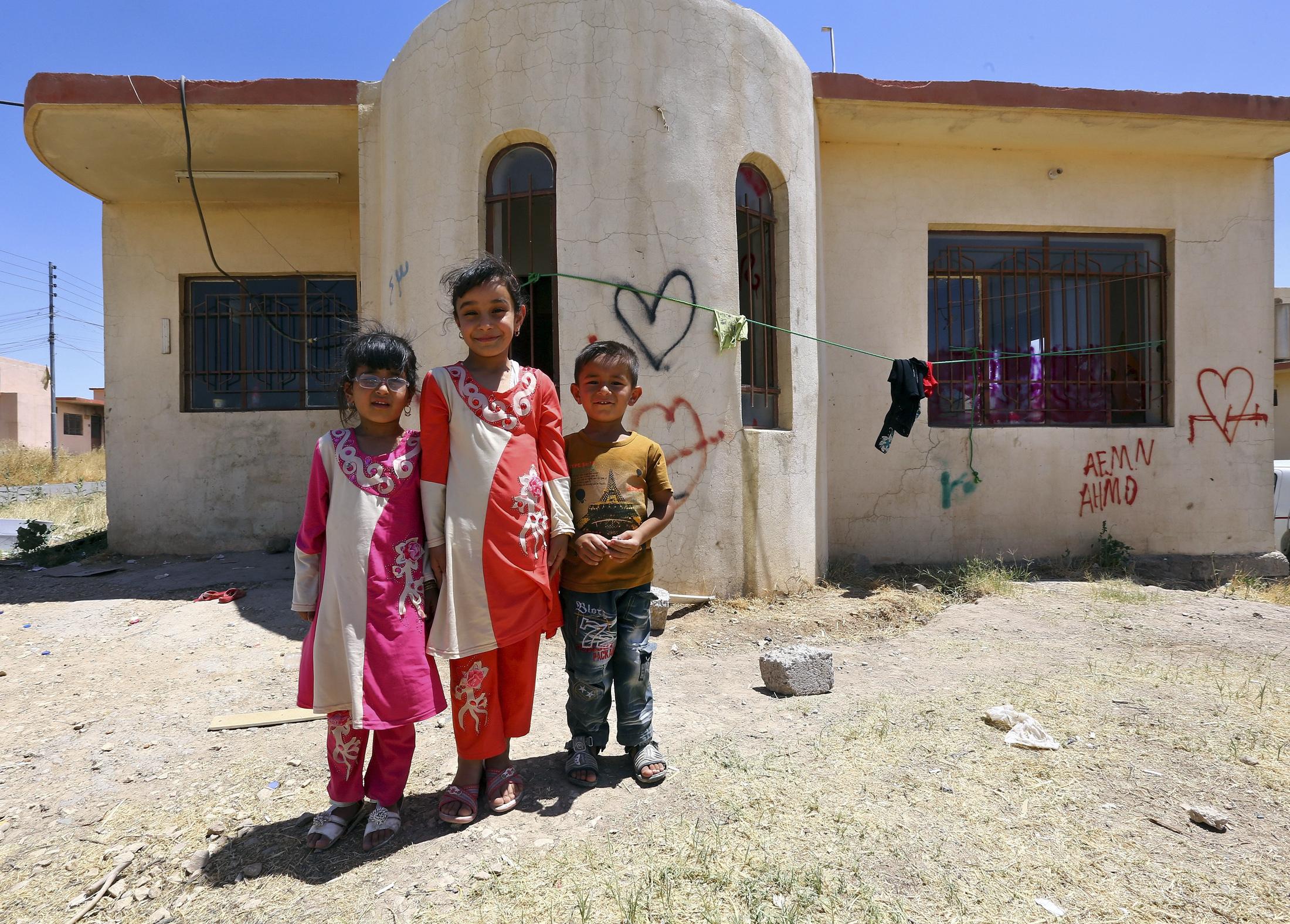Iraq’s Dwindling Christians Wonder If It’s Time To Leave Iraq
 By Leila Fadel
By Leila Fadel
Iraqis attend Mass at the Chaldean Church of the Virgin Mary of the Harvest, in al-Qoush on June 15. Both Christians and Muslims fleeing the ISIS takeover of Mosul in northern Iraq have taken refuge in al-Qoush, an ancient Christian village.
About 20 miles outside the embattled northern Iraqi city of Mosul lies the Christian village of Al-Qoush. It’s taken in about 2,000 residents from Mosul who fled after the militant Islamist group ISIS captured that city.
In recent days, news coverage from Iraq has focused largely on the Sunni-Shiite divide in that country. But Iraq is also home to a Christian community, which traces its origins in the earliest days of Christianity.
During a visit to Al-Qoush, a village of low stone homes and churches at the foot of a mountain, we met with members of the committee that oversees displaced people.
The committee was formed in 2008 when Christians were fleeing Mosul after a spate of killings that targeted and terrified the community. More than 260 families fled here. In 2010, it happened again, and again Christian families came here or sought safe haven in other Christian villages in the Nineveh plains.
But this time, after ISIS took over Mosul, and vowed in a charter to destroy shrines and monuments that go against their extreme version of Islam, the bulk of the displaced that came to al-Qoush are Muslim.
Only about 40 Christian families arrived in al-Qoush. It is a sign of just how few Christians are left in Iraq — and in Mosul in particular.
It’s a trend that’s reflected across the region: In the mid-20th century, Christians were estimated to be about 20 percent of the Middle East’s population. Today, it’s 5 percent at most.
After meeting with the committee, which works out of the Chaldean Catholic Church in the village, we headed to the home of Abu Younes, a dental technician who was born in Mosul. He asked to be identified by a nickname for his safety.
Abu Younes left his hometown when ISIS swept in. He first rented his home in al-Qoush in 2008 when Christians were being targeted and killed. He returned to Mosul but kept the house in al-Qoush just in case. When ISIS took the city recently, he and several other families fled again to the village — which is secured by the Kurdish peshmerga forces.
But Abu Younes wants to go back to his city and to his life. He’s already returned for brief visits since the arrival of ISIS, which is known for killing people who don’t agree with their extreme beliefs.
Up to this point, he says, it’s been fine in Mosul. His sister walked in the street with her hair uncovered and was greeted cordially by one of the gunmen. And although there are problems with water and electricity, so far he doesn’t feel targeted because he’s Christian.
Abu Younes says that one Christian family that had been in al-Qoush returned to Mosul, and nothing has happened to them. He says he is waiting for things to become clear.
The gunmen on the streets are from different groups, he says, and he’s not sure which group is in control.
Abu Younes says that he is used to a hard life. If there’s a war with gunfire and killings, he says, he won’t leave. But if there is a war on personal freedoms — if his daughters and wife are forced to cover their hair — he says this is something he can’t bear. Then, he says, he would have to leave Iraq.
But Um Karam, a relative, sits nearby and shakes her head as Abu Younes speaks. She says she can’t go back.
Her husband was killed by gunmen in 2008 and she has an 18-year-old son. She wants help to get out of Iraq so she doesn’t lose her son, too.
Abu Younes jumps in. We want Iraq to return to what it was, he says, and God willing it will.
Before we left the village, we spoke to Renan Mansour, a teacher and member of the committee overseeing the displaced.
He’s worried about all the strangers, particularly the Muslims, who’ve entered the village.
He says they don’t let anyone outside their homes after 9 a.m. Mansour says he drives around the village until 2 or 3 a.m. to make sure nothing’s happening.
These people came, he says, but we don’t know who they are and this is a dangerous time.
Muslims who fled Mosul now fill three schools in the village. An extended family of Turkmen Shiites is living in a kindergarten. They’re afraid ISIS will kill them because of their sect. They’ve already heard of Shiite neighbors and friends that were killed in Mosul. The other schools have Sunni Muslims. And the Christians were absorbed into homes in the village.
There was a lot of pressure to let the families in, Mansour says. But now, he says, we don’t know what to do with them. And when a camp is available, he says, they will have to leave al-Qoush.
Copyright 2014 NPR. To see more, visit http://www.npr.org/.
Transcript
LINDA WERTHEIMER, HOST:
This is MORNING EDITION from NPR News. I’m Linda Wertheimer.
RENEE MONTAGNE, HOST:
And I’m Renee Montagne. We’ve been hearing a great deal in recent days about the Sunni-Shia divide in Iraq. Iraq is also home to a Christian community which has its origins in the earliest days of Christianity. And about 20 miles outside of the city of Mosul is the Christian village of Alqosh. It has taken in about 2000 residents of Mosul who fled after the militant Islamist group ISIS captured that city. NPR’s Leila Fadel paid a visit.
UNIDENTIFIED MAN: (Foreign language spoken).
LEILA FADEL, BYLINE: First, we meet with members of the committee that oversees displaced people in Alqosh, a village of low stone homes and churches at the foot of a mountain. The committee was formed in 2008, when Christians were fleeing Mosul after a spate of killings that targeted and terrified the community. More than 260 families fled here. In 2010, it happened again. And again, Christian families came here or sought safe haven in other Christian villages in the Nineveh plains. But this time, after ISIS took over Mosul and vowed to destroy shrines and monuments that go against their extreme version of Islam, the bulk of the displaced that came here are Muslim. Only about 40 Christian families arrived in Alqosh. It is a sign of just how few Christians are left in Iraq and in Mosul, in particular. We leave the committee that works out of the Chaldean Catholic Church in the village and head to the home of Abu Younes, a dental technician who left Mosul when ISIS swept in.
ABU YOUNES: (Foreign language spoken).
FADEL: He asked we identify him with a nickname for his safety.
YOUNES: (Foreign language spoken).
FADEL: Abu Younes first rented this home in 2008, when Christians were being targeted and killed. He returned to Mosul but kept the house in Alqosh, just in case. When ISIS took the city, he and several other families fled here again. The village is secured by the Kurdish Peshmerga forces.
YOUNES: (Foreign language spoken).
FADEL: But Abu Younes wants to go back to his city and to his life. He’s already returned for brief visits since ISIS arrived.
YOUNES: (Foreign language spoken).
FADEL: Up until this point, it’s fine, he says.
His sister walked in the street with her hair uncovered and was greeted cordially by one of the gunmen. And although there are problems with water and electricity, so far, he doesn’t feel targeted because he is Christian. That is the fear – that under ISIS, which is known for killing people who don’t agree with this extreme beliefs, non-Muslims and Muslims of other sects or interpretations won’t survive.
YOUNES: (Foreign language spoken).
FADEL: Abu Younes says, one Christian family that was here with us went back and nothing’s happened to them. I am waiting for things to become clear.
YOUNES: (Foreign language spoken).
FADEL: He says the gunmen are from different groups, and he’s not sure which group is in control.
YOUNES: (Foreign language spoken).
FADEL: I’m used to a hard life, he says. If there is a war with guns and killing, I won’t leave. But if there’s a war on personal freedoms, if my daughters and my wife are forced to cover their hair – this is something I can’t bare. Then, I will have to leave Iraq. But Um Karam, a relative, sits nearby and shakes her head as Abu Younes speaks. She says she can’t go back.
UM KARAM: (Foreign language spoken).
FADEL: Her husband was killed by gunmen in 2008, and she has an 18-year-old son. She wants help to leave Iraq so she doesn’t lose him, too.
YOUNES: (Foreign language spoken).
FADEL: Abu Younes jumps in. We want Iraq to return to what it was, God willing it will. We say our goodbyes, and then we go. But before we leave the village, we talk to Renan Mansour, a teacher and member of the committee overseeing the displaced. He’s worried about all the strangers, particularly the Muslims who’ve entered the village.
RENAN MANSOUR: (Foreign language spoken).
FADEL: After 9 p.m. we don’t let anyone outside their homes, he says. And I drive around the village until 2 or 3 a.m. to make sure nothing’s happening.
MANSOUR: (Foreign language spoken).
FADEL: He says, the truth is, these people came, but we don’t know who they are, and this is a dangerous time. Three schools are filled with Muslim refugees. And extended family of Turkmen Shia is living in a kindergarten. They’re afraid they will be killed by ISIS because of their sect. They’ve already heard of Shia Muslim neighbors and friends that were killed in Mosul. The other schools have Sunni Muslims, and the Christians were absorbed into homes in the village.
MANSOUR: (Foreign language spoken).
FADEL: Mansour says there was a lot of pressure to let the families in. But we don’t know what to do with them now, and when a camp is available, they have to leave. Leila Fadel, NPR News. Transcript provided by NPR, Copyright NPR.
http://wwno.org/post/iraqs-dwindling-christians-wonder-if-its-time-leave-iraq


